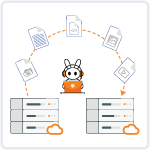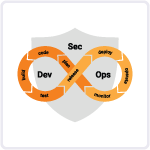In the rapidly evolving landscape of information technology, cloud computing has emerged as a transformative force, reshaping the way businesses and individuals interact with data and applications. Among the major players in the global cloud computing market, Alibaba Cloud stands out as a powerhouse, offering a wide range of services and solutions. In this comprehensive blog, we will dive deep into the world of Alibaba Cloud computing, exploring its history, core services, advantages, and why it is a key player in the cloud industry.
The Origin of Alibaba Cloud
To understand Alibaba Cloud, we need to rewind the clock to the late 1990s when a visionary entrepreneur named Jack Ma founded Alibaba Group. Initially an e-commerce company, Alibaba quickly recognized the importance of cloud computing to support its own growing operations. This realization gave birth to Alibaba Cloud, also known as Aliyun, in 2009. Then began the journey of Alibaba cloud computing.
Alibaba Cloud was established with the goal of providing world-class Alibaba Cloud computing and data management services to businesses in China and beyond. Over the years, it has grown exponentially, establishing a global presence with data centers and services in various regions across the world.
Alibaba Cloud Core Services
Alibaba Cloud offers a comprehensive suite of cloud computing services, catering to a diverse range of requirements. Some of the core services include:
- Elastic Compute Service (ECS): This is Alibaba Cloud’s flagship virtual machine (VM) offering, allowing users to deploy scalable and customizable computing resources in the cloud. ECS instances support various operating systems and come with options for different computing power and storage configurations.
- Object Storage Service (OSS): OSS is Alibaba Cloud’s storage solution that provides scalable and secure object storage. It is similar to Amazon S3 and is suitable for storing large amounts of unstructured data like images, videos, and backups.
- Alibaba Cloud Databases: Alibaba Cloud offers a range of database services, including ApsaraDB for RDS (Relational Database Service), NoSQL databases like Table Store, and time-series databases like Time Series Database (TSDB). These databases are designed to handle various data management needs.
- Container Service: Alibaba Cloud Container Service enables users to manage and orchestrate containerized applications using Kubernetes or other container orchestration tools. It makes containerized application deployment and scalability easier.
- Artificial Intelligence and Machine Learning: Alibaba Cloud provides a suite of AI and ML services, including image and speech recognition, natural language processing, and machine learning platform services. These tools empower businesses to harness the power of AI in their applications.
- Security Services: Security is a top priority for Alibaba Cloud. They offer a range of security services, including Anti-DDoS, Web Application Firewall (WAF), and Identity and Access Management (IAM) to protect data and applications from threats.
- Content Delivery Network (CDN): Alibaba Cloud CDN enhances the performance and availability of web applications by distributing content across a global network of edge servers.
- Internet of Things (IoT): Alibaba Cloud IoT provides a platform for connecting and managing IoT devices, collecting and analyzing data, and building IoT applications.
- Big Data and Analytics: Alibaba Cloud offers various big data and analytics services, including MaxCompute (data warehousing and analytics), DataWorks (data integration and ETL), and QuickBI (business intelligence).
Advantages of Alibaba Cloud Computing
Alibaba Cloud Computing has gained prominence in the cloud computing arena due to several key advantages:
- Global Reach: With a rapidly expanding global network of data centers and edge locations, It serves customers in over 200 countries and regions, ensuring low-latency access and compliance with local data regulations.
- Cost-Effective: Its pay-as-you-go pricing model allows businesses to scale resources as needed, minimizing upfront costs and optimizing budget utilization.
- Scalability: It offers on-demand scalability, enabling businesses to quickly respond to changing workloads and customer demands.
- Security and Compliance: It places a strong emphasis on security and compliance, with certifications such as ISO 27001, PCI DSS, and GDPR compliance, giving customers peace of mind.
- Advanced Technologies: It invests heavily in cutting-edge technologies, including AI, IoT, and blockchain, empowering businesses to innovate and stay competitive.
- Partnerships: It has a strong ecosystem of partners, including software vendors, system integrators, and managed service providers, making it easier for businesses to adopt and integrate cloud solutions.
Use Cases and Success Stories
To illustrate the practical applications of Alibaba Cloud, let’s explore a few use cases and success stories:
- E-commerce: Alibaba Group itself relies heavily on Alibaba Cloud to power its e-commerce platforms, including Taobao and Tmall, which are some of the largest online marketplaces in the world.
- Gaming: Online gaming companies like NetEase and Efun leverage Alibaba Cloud’s scalability and global reach to deliver seamless gaming experiences to millions of users.
- Healthcare: Organizations like Jio Health use Alibaba Cloud’s AI and big data capabilities to analyze medical data and improve patient care.
- Manufacturing: Companies like Geely and Hikvision use Alibaba Cloud for IoT and edge computing to enhance their manufacturing processes and supply chain management.
Getting Started with Alibaba Cloud
If you’re interested in harnessing the power of Alibaba Cloud for your business or personal projects, here’s a brief guide to getting started:
- Sign Up: Visit the website and sign up for an account.
- Explore the Console: Familiarize yourself with the Alibaba Cloud Management Console, where you can access and manage services, create instances, and configure resources.
- Documentation and Training: It offers extensive documentation, tutorials, and training resources to help you get started and become proficient in using their services.
- Support and Community: Join the Alibaba Cloud community and take advantage of their support services to troubleshoot issues and get assistance.
- Start Small: Begin by deploying a simple project or application to understand how Alibaba Cloud services work. As you gain confidence, you can expand your usage.
Benefits of outsourcing Alibaba cloud management
Outsourcing Alibaba Cloud management can bring numerous benefits to businesses of all sizes, providing them with the expertise and resources required to effectively navigate the complex world of Alibaba Cloud computing. Here are some of the primary benefits:
- Expertise and Experience: When you outsource Alibaba Cloud management to a specialized service provider like SupportFly, you gain access to a team of experts who are well-versed in cloud infrastructure, best practices, and the latest technologies. This expertise can help you optimize your cloud environment, ensure security, and stay up-to-date with industry trends.
- Cost Efficiency: Managing it in-house can be costly, as it requires hiring and training staff, investing in hardware and software, and dealing with operational expenses. Outsourcing helps you to convert these fixed expenditures into variable costs by only paying for the services you require when you require them.
- Focus on Core Competencies: By entrusting Alibaba Cloud management to a third party expert like SupportFly, your internal teams can concentrate on strategic initiatives and core business functions. This enhances productivity and allows you to allocate resources more efficiently.
- Scalability and Flexibility: Outsourcing provides the flexibility to scale your cloud resources up or down based on your evolving needs. This agility is crucial for businesses experiencing growth or seasonal fluctuations in demand.
- Enhanced Security: Experienced cloud management providers like SupportFly have robust security measures and protocols in place to protect your data and applications from threats. They stay updated with the latest security trends and vulnerabilities, ensuring your cloud environment is well-protected.
- 24/7 Monitoring and Support: Many managed service providers offer round-the-clock monitoring and support. This means that issues can be detected and resolved promptly, minimizing downtime and ensuring high availability.
- Compliance and Governance: Outsourcing can help you navigate the complex world of compliance and regulatory requirements. Managed service providers often have experience in ensuring that your cloud environment adheres to industry-specific regulations.
- Disaster Recovery and Backup: Managed service providers like SupportFly typically have robust disaster recovery and backup solutions in place. This ensures data redundancy and minimizes the risk of data loss in case of unexpected events.
- Performance Optimization: Outsourcing providers continuously monitor your cloud environment’s performance, identifying bottlenecks and areas for improvement. This leads to optimized resource allocation and cost savings.
- Access to Advanced Tools and Technologies: Experts at SupportFly have access to advanced cloud management tools and technologies that may not be readily available to individual organizations. This can further enhance the efficiency and effectiveness of your cloud operations.
- Reduced Downtime: With proactive monitoring and maintenance, managed Alibaba Cloud services aim to minimize downtime. This is critical for businesses that rely on high availability to serve customers and maintain operations.
- Peace of Mind: Knowing that your Alibaba Cloud environment is in the hands of experts can provide peace of mind. It reduces the stress and responsibility associated with managing complex cloud infrastructures.
Outsourcing Alibaba Cloud management can be a strategic decision that offers cost savings, expertise, and flexibility while allowing your organization to focus on its core business objectives. It’s a powerful way to leverage the full potential of cloud computing without the operational burden.
Why outsourcing Alibaba cloud management is a wise choice?
Managing cloud resources, especially in the dynamic and robust environment of Alibaba Cloud, can be a daunting and time-consuming task for businesses. The complexities of infrastructure setup, resource scaling, security measures, and constant monitoring can divert valuable time and resources from your core business operations. That’s where SupportFly comes in.
We specialize in taking the hassle out of Alibaba Cloud management, offering tailored solutions that allow you to focus on what you do best – growing your business. Our team of experts is equipped to handle all aspects of cloud management, ensuring that your Alibaba Cloud infrastructure is not just operational but also optimized for performance and cost-efficiency. Let us be your trusted partner in harnessing the full potential of Alibaba Cloud while you concentrate on achieving your business goals.
Conclusion
Alibaba Cloud computing has emerged as a major player in the global cloud industry, offering a wide array of services, global reach, and innovative technologies. Whether you’re a startup looking to scale rapidly, an enterprise seeking to optimize your IT infrastructure, or an individual developer experimenting with cloud solutions, Alibaba Cloud has something to offer. With its continuous growth and commitment to excellence, Alibaba Cloud is poised to shape the future of cloud computing for years to come.We recommend leveraging the full potential of Alibaba cloud computing with SupportFly.
What is Alibaba Cloud computing?
Alibaba Cloud computing, also known as Alibaba Cloud or Aliyun, is the cloud computing arm of Alibaba Group, one of the world’s leading e-commerce and technology conglomerates. It provides a comprehensive suite of cloud services, including computing, storage, database, security, analytics, and more, to help businesses and individuals build, deploy, and manage applications and websites in the cloud.
What are some key services offered by Alibaba Cloud?
Alibaba Cloud offers a wide range of services, including Elastic Compute Service (ECS) for virtual servers, Object Storage Service (OSS) for scalable storage, ApsaraDB for databases, and a variety of AI and machine learning tools. They also provide solutions for data analytics, content delivery, and cybersecurity, among others.
How does Alibaba Cloud differ from other cloud providers like AWS and Azure?
Alibaba Cloud is a major player in the cloud industry, but it has some differences compared to AWS and Azure. It has a strong presence in Asia and China, making it a preferred choice for businesses looking to expand into these markets. Additionally, Alibaba Cloud offers a unique set of services tailored to the needs of global and local customers, often with competitive pricing.






































































